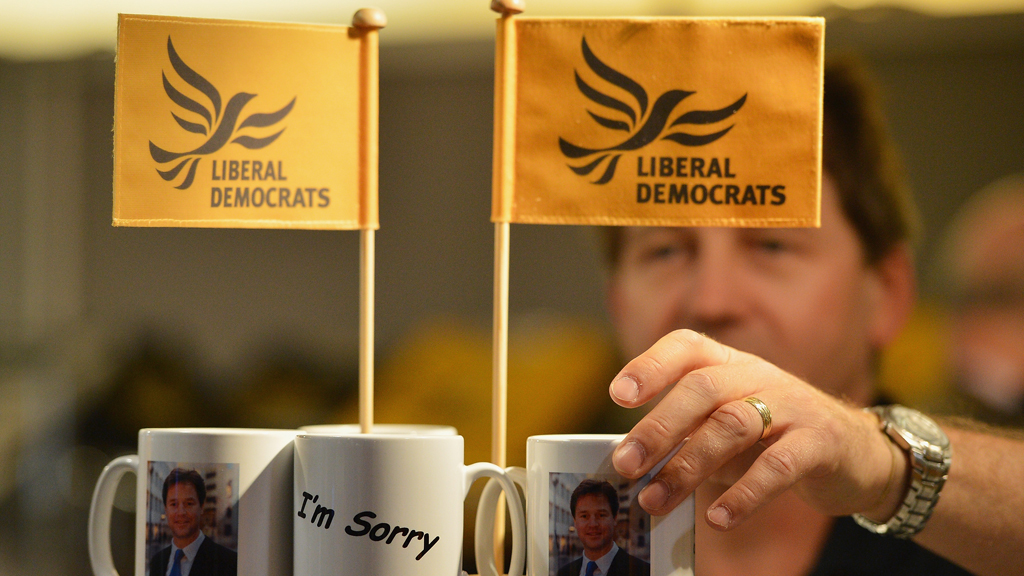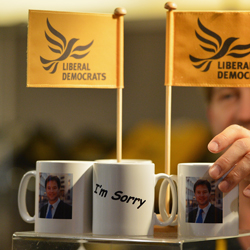What role do think tanks play in Lib Dem policy?
Along with the politicians, press and party members, the Lib Dem conference will be awash with think tanks hoping to make their mark. But how do they influence policy and which appeal to Lib Dems?

Metres away from the rain sodden Brighton pier, the Liberal Democrat party conference is already in full swing with the annual questions about strategy and who will be party leader already emerging.
However on the fringes of the speeches by the party’s leading lights, think tanks from across the political spectrum are holding discussions, introducing delegates to their well honed research and political philosophy, and wowing politicos with their Big Ideas.
Think tanks – the home of scholarly research into political policy – are where ministers choose to launch particularly clever policies, or name drop when quoting research that backs up their point. They are also perceived as the hidden arm of government – policy wonks who manage to infiltrate ministers’ thinking and get their ideas into parliament. If anything further was needed to cement their role it was the appearance of a ‘Think Camp’ in the most recent episode of political satire The Thick of It, where ministers were called to “go truffling in the forest of knowledge”.
But what role do these organisations have when it comes to the way the country is run? Despite being part of government, the Liberal Democrats do not have the same historic relationship with think tanks as Labour and the Conservatives, both of which have affiliations with a number of key groups. And there is a perception among Lib Dem members that the party has been left out in the cold.
“Centreforum (a self-described “independent, liberal think tank”) is very influential, but beyond that, there are not that many,” Mark Pack, co-editor of activist website Liberal Democrat Voice, told Channel 4 News. “Policies come much more from within the party, from my impression. Think tanks are not really exercising their potential influence.”
From concept to policy
This has changed somewhat under the party’s more recent incarnation with Clegg as its captain. The former director of Demos, Richard Reeves, went on to work as Nick Clegg’s director of strategy – and brought with him Demos’ influential research on the cooperative sector. David Laws, hailed as one of the party’s visionaries before he was disgraced in an expenses scandal, favoured much of the research on reforming public services from the Social Market Foundation.
The Lib Dem’s flagship ‘pupil premium’ policy was originally conceived in a Demos report, Ex Curricula, according to Demos, and the author of the report previously worked on the school age pupil premium at the Institute for Public Policy Research (IPPR), the think tank often favoured by Labour.
Lib Dem think tank launched
Nonetheless, enough Lib Dems believed there was a gap in the think tank market for a new think tank, Liberal Insight, to be established in April this year – a think tank dedicated to coming up with Lib Dem policies. Chaired by party president Tim Farron, it’s aim is to “contribute radical, progressive and innovative ideas to a vision of liberal society”.
“One of challenges the Lib Dems have faced, is that there hasn’t been the ability to produce off the shelf policies when something comes up in the news,” says Tom Smith, Liberal Insight director. While the government has the whole of the civil service at its disposal, the perception among some ministers is that “it’s easier” and faster to look to a think tank, than “getting civil service to rustle something up,” Mr Smith adds.

The lobbying factor
While they are credited for developing much government policy, think tanks are also criticised for providing a veil that allows vested interests to lobby government, and for more concerned with PR than they are with academic research. Or as the filmmaker and journalist Adam Curtis puts it in a blog from last year: “They are ideologically motivated PR organisations masquerading as the sort of scholarly institute that [Friedrich] Hayek first suggested to Antony Fisher.”
Much of this perception comes down to funding. Think tanks can be funded by everything from private donors, corporations or government departments, but not all are completely open about who gives them what. A limited survey of 15 think tanks’ funding by George Monbiot last year, in which three refused to respond and six refused to offer any useful information raised questions about their accountability.
Even so-called ‘wholesome’ policies are also worth scrutiny. That Demos study on the co-operative sector that so influenced Nick Clegg was sponsored by the beacon of the co-operative movement, John Lewis.
Transparency
But this does not have to be a problem, says Duncan O’Leary, Demos director, as long as think tanks are transparent about where their funding comes from (something that not all think tanks are willing to do). Mr O’Leary adds that to be credible, think tanks should also aim for a spread of benefactors, so are not reliant on one source.
“The reality is that think tanks are only as influential as their ideas are useful to politicians,” Mr O’Leary told Channel 4 News. “There are occasional scare stories about the influence of think tanks, but politicians make their own choices about which ideas and policy recommendations they think are relevant and interesting.”
While it is parties in government who grab the headlines, Mr O’Leary believes that think tanks actually have more influence on those parties in opposition. “The government have a huge army behind them – the civil service. Actually it’s often in opposition that programmes for government come together, as parties can spend more time focusing on ideas.”
Policy junction
The Liberal Democrats have had plenty of time in opposition to come up with policies. But as Nick Clegg’s apology shows, the party wasn’t so practiced about making them happen when in government.
Much of the talk at the party conference so far has been about coming up with a cohesive, long-term strategy that establishes where the Lib Dems sit in the political party spectrum after spending two years cohabiting with the Tories. The new director of strategy, Ryan Coetzee is one part of that.
“We’re at an interesting policy junction with the apparent breakdown of relations in the coalition in recent months,” says Tom Smith of Liberal Insight, who believes the party will again focus on the core areas of jobs, environment, tax and education. But whether think tanks will play a role in the party’s new direction remains to be seen.
“One of the big problems in the Lib Dems is that a lot of the effort of the party switched to concentrating on being in government,” adds Mr Smith. “Now we need to come up with long term strategic thinking up to 2015 and beyond.”
-
Latest news
-
Windrush scandal: returning to the UK after a forty year wait6m

-
Netanyahu ‘survival’ depends on ‘expanding war’ says head of Palestinian National Initiative5m

-
Proposed law change could strip parental rights from paedophiles5m

-
Hugh Grant settles privacy lawsuit against The Sun newspaper publisher2m

-
Post Office Scandal: what did top executive know?6m

-





